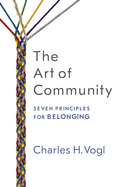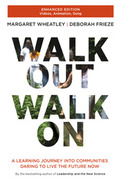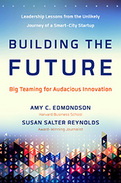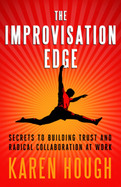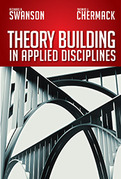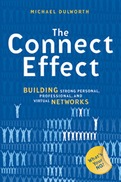2016
Strong cultures help people support one another, share their passions, and achieve big goals. And such cultures of belonging aren't just happy accidents - they can be purposefully cultivated, whether they're in a company, a faith institution or among friends and enthusiasts. Drawing on 3,000 years of history and his personal experience, Charles Vogl lays out seven time-tested principles for growing enduring, effective and connected communities. He provides hands-on tools for creatively adapting these principles to any group—formal or informal, mission driven or social, physical or virtual. This book is a guide for leaders seeking to build a vibrant, living culture that will enrich lives.
Winner of the Nautilus Silver Book Award in the Business and Leadership Category.
Provides an intimate experience of how seven healthy and resilient communities took on intractable problems by working together in new and different ways.
The Enhanced Edition includes 25 minutes of animation, video, and audio. The animation shows the “Two Loops Theory of Change” with a voiceover from co-author Deborah Frieze. Three videos show inspirational “Walk On” communities in Brazil, South Africa, and India. This edition also includes the “Walk Out Walk On” theme song.
- 2012 Nautilus Silver Award Winner in Social Change Category
-
By the bestselling author of Leadership and the New Science and Turning to One Another
-
Provides an intimate experience of how seven healthy and resilient communities took on intractable problems by working together in new and different ways
-
immerses the reader in the experience of each community through stories, essays, first-person accounts, and over 100 color photos
This is an era of increasingly complex problems, fewer and fewer resources to address them, and failing solutions. Is it possible to find viable solutions to the challenges we face today as individuals, communities, and nations? This inspiring book takes readers on a learning journey to seven communities around the world to meet people who have "walked out" of limiting beliefs and assumptions and "walked on" to create healthy and resilient communities. These Walk Outs who Walk On use their ingenuity and caring to figure out how to work with what they have to create what they need.
In India, we meet people from Shikshantar, a community that is rejecting the modern culture of money, with its emphasis on self-interest and scarcity, in favor of a gift culture based on generosity and reciprocity. In Zimbabwe, we discover the capacity people have to adapt and invent new ways of surviving and thriving in the face of total systems collapse.
Through essays, stories, and beautiful color photographs, Wheatley and Frieze immerse us in these communities that are accomplishing extraordinary things by relying on everyone to be an entrepreneur, a leader, an artist. From Mexico to Greece, from Columbus, Ohio to Johannesburg, South Africa, we discover that every community has within itself the ingenuity, intelligence, and inventiveness to solve the seemingly insolvable. "It's almost like we discovered a gift inside ourselves," one Brazilian said, "something that was already there.
2016
Machiavelli famously wrote, “There is nothing more difficult to take in hand, more perilous to conduct, or more uncertain in its success than to take the lead in the introduction of a new order of things.”
That's what this book is about—innovation far more audacious than a new way to find a restaurant or a smart phone you can wear on your wrist. Amy C. Edmondson and Susan Salter Reynolds explore large-scale systemic innovation that calls for “big teaming”: intense collaboration between professions and industries with completely different mindsets. This demands leadership combining an expansive vision with deliberative incremental action—not an easy balance.
To explore the kind of leadership required to build the future we need, Edmondson and Reynolds tell the story of Living PlanIT. This award-winning “smart city” start-up was launched with a breathtakingly ambitious goal: creating a showcase high-tech city from scratch to pilot its software—quite literally setting out to build the future. This meant a joint effort spanning a truly disparate group of software entrepreneurs, real estate developers, city government officials, architects, construction companies, and technology corporations. By taking a close look at the work, norms, and values in each of these professional domains, we gain new insight into why teaming across fields is so challenging. And we get to know Living PlanIT's leaders, following them and their partners through cycles of hope, exhaustion, disillusionment, pragmatism, and renewal. There are powerful lessons here for anyone, in any industry, seeking to drive audacious innovation.
- The first multidisciplinary book specifically on building, evaluating, and developing theories in academic fields that apply research to professional practice
- Offers a five-phase model that can be used to build and test a theory in any applied discipline
- Written by two highly respected scholars
Theory matters in applied disciplines-fields that apply scholarly research to professional practice, such as management, social work, health care, human resource development, education, and many others. Because these disciplines deal with human beings in the real world, a flawed theory can result in actual harm to people and institutions.
When faced with a professional problem, practitioners resort to the latest fad or simply throw everything and anything at it because of the lack of sound theory. Scholars deal with problems by slicing them into small segments to study them but fail to address the practical implications. What's needed is a way to unite research and practice to create robust theory.
This is exactly what Richard Swanson and Thomas Chermack offer here: a complete, five-step method for developing sound, field-tested theory in applied disciplines. Unlike many existing methods, which cover only the initial conceptualization of a theory, the authors offer a complete approach, from conceptualizing a theory to creating relevant assessment criteria, establishing a research agenda to test the theory's validity, applying the theoretical concepts in the real world, and using that experience to further refine and improve the theory. The method is not restricted to any single discipline, nor is it beholden to any research ideology.
Swanson and Chermack provide a set of tools for each phase of the process, making this book accessible and applicable to a wide audience. And in addition to examples in each chapter, they offer two extended case examples of complete theory building. With flawed theories impeding the development of many applied disciplines, this book is desperately needed.
2008
•Offers a systematic approach to developing your networking skills—including an “NQ test” to help you quantify your networking ability
•Features tools and techniques specific to each type of network, as well as advice from leading executives, researchers, and thought leaders
•Copublished with ASTD, the leading association for human resource development professionals


